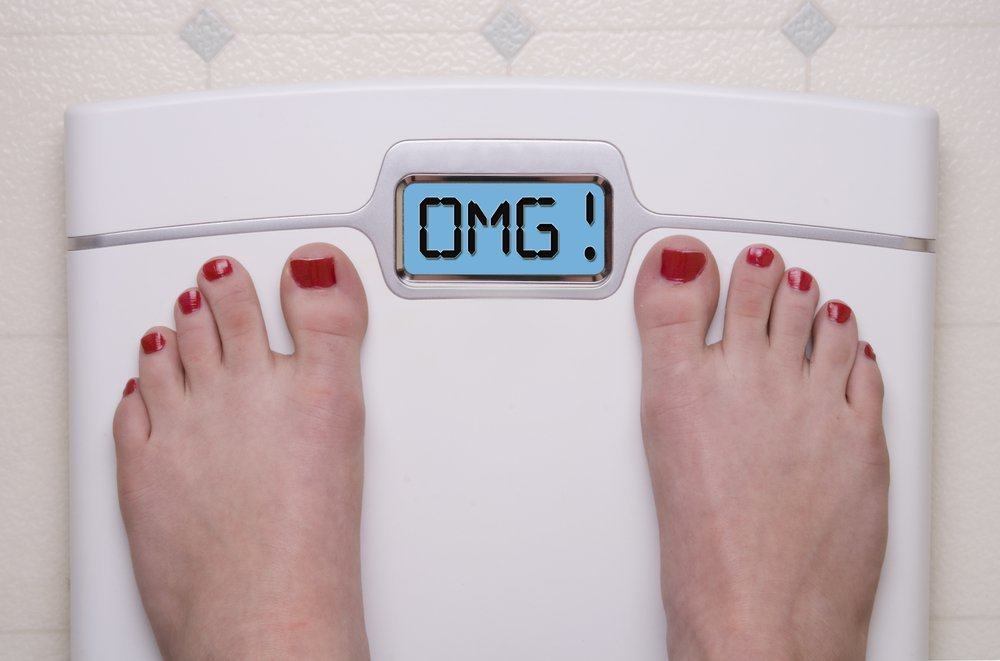Contents:
Medical Video: How Does Exercise Impact Weight Loss?
Once you wake up in the morning, you weigh weight (after emptying the bladder, but before breakfast, of course), and ... finally the needle shows fantastic numbers! All the hard work of a strict diet and regular exercise has now been paid off. But then, you decide to weigh yourself again before going to bed, and the scale shows two kilograms of weight gain. How come?
He said, 3500 calorie intake equals half a kilogram of extra fat, but you don't eat up to 10,000 calories a day. Where did these two kilograms come from? Is it true that you can get up to an additional two kilograms of weight in just one day?
But wait, it's not fat
Calm down, you don't lose muscle / get extra fat every time the scale needle swings to the right - as you have thought so far.
Did you know, the human body can store a little weight in our large intestine? There is not much science needed to support this one, weigh yourself before and after defecating. You can experience changes in body weight from around 1-2 kilograms by just going to the toilet.
Heavy ups and downs are normal, and this happens to everyone. These fluctuations can be caused by various factors, such as consumption of large meals, excess salt intake, constipation, and hormonal changes. One thing you should know is that the extra weight you see on the scale does not come from increasing body fat; That extra "fat" can come from water, waste products or other substances that remain temporarily in your body.
What causes differences in weight in the morning and evening?
When really talking about weight fluctuations, water is your main suspect. Changes in body weight per day, or even per hour, are often caused by how much water you hold in the body. "Throughout the day, our bodies will hold fluids while we eat and drink," said Kelly Hogan, MS, RD, CDN, clinical nutrition coordinator at the Dubin Breast Center at Mount Sinai Hospital, reported by Daily Burn. Hogan continued, only by consuming two small cups of water, for example, but you also get food from food. This can add a few grams of extra weight. It has nothing to do with body fat percentage or muscle mass.
Also, eating too much salty food causes you to feel dehydrated and bloated because your body retains fluid in the body. When we don't drink enough fluids, the body will automatically hold on to any liquid water left in the body to maintain fluid balance. Then, our kidneys release less fluid through the urine because the kidneys are programmed to maintain that balance. This is what causes a shift in numbers on your scales.
The up and down body weight is also caused by power reserve storage
In addition to salt and water, the amount of carbohydrates you eat also affects how much water is accumulated in the body because our bodies need additional fluids to store glycogen (carbohydrates) as energy.
To store every gram of glycogen, the body needs three grams of water. When we eat carbohydrates, this simple sugar intake is stored as glycogen in various places in the body, including red and white blood cells, the brain, as well as the kidneys (in small amounts). Glycogen functions as a secondary long-term energy storage, after fat. Muscle glycogen is converted to glucose by muscle cells, and liver glycogen is converted to glucose for use throughout the body, including the central nervous system.
Every gram of carbohydrate causes your body to maintain 2.7-4 times that of glycogen in water. The combination of increasing carbohydrates and water that binds to each carbohydrate causes our weight to increase.
Curious why do you feel your body becoming lighter after a sweat of exercise? Even though you may see weight loss immediately after intense exercise, you may get more weight if your muscles accumulate fluid. "Resistance training or even trying new exercises can result in fluid buildup if the muscles work hard," Hogan said. Part of the body's response when repairing microscopic tear wounds to the muscles is fluid retention.
How much weight is usually gained from these weight fluctuations?
Fluctuations in body weight can result in a temporary increase in body weight of up to 2.5 kg per day. It takes some time for your digestive system to be able to process the food, liquid and salt you consume, and substances that are still being processed properly before contributing to your actual weight.
When you have a big dinner the night before, your weight will remain the same when you wake up in the morning if you don't have bowel movements. This happens especially if you eat foods that contain lots of salt. Even if you eat more than usual, your weight cannot increase significantly overnight. Your actual weight is the result of a long-term ongoing process.
Weigh your weight once a week, not every day
One way to prevent stress that results from weight fluctuations is to refrain from weighing as much as possible every day. Weigh yourself once a week, and do this without wearing clothes and shoes, which can add one or two kilograms on a scale.
Try to weigh yourself after you empty your stomach in the morning. If you find that your weight is still up and down when you weigh once a week, you should drink plenty of water to reduce the amount of salt in the body. Then, weigh the weight once again two days later, in the morning. If the results are still high, you may need to reassess your diet and exercise program to ensure that you don't consume more calories than you burn.
READ ALSO:
- Why Stress Makes Us Eat Too Much?
- The Best Foods to Eat Before and After Exercise
- How Healthy Is Being a Vegan?












